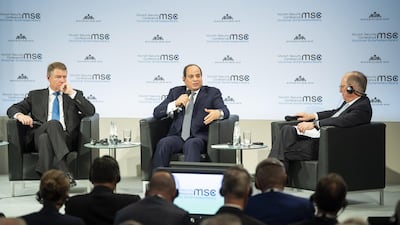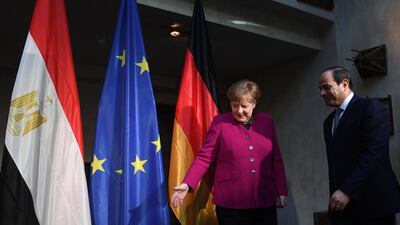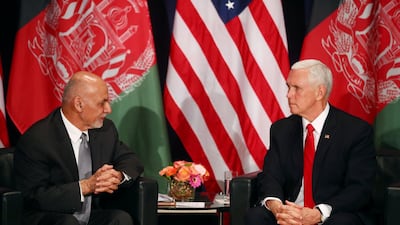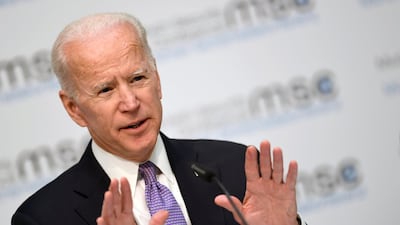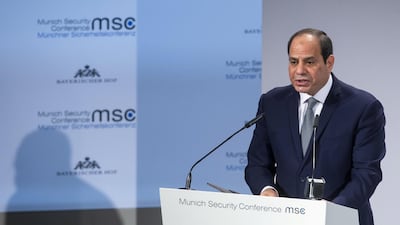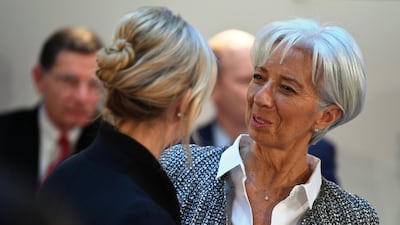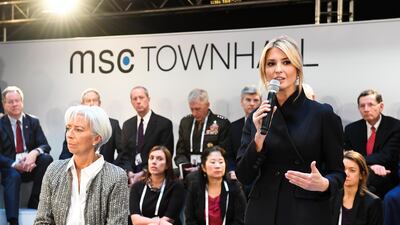Egyptian President Abdel Fattah El Sisi called for global action against extremism promoted online and spread over digital platforms, claiming that inaction was swelling the ranks of terrorist groups.
Speaking at the Munich Security Conference in Germany, Mr El Sisi said security and stability in countries such as his own was threatened by viral recruitment and plotting.
“As far back 2014 we called on the world to tackle the use of advanced technology to recruit terrorists and bring harm to the world by spreading extremist and Islamist narratives,” he said. “People are lured into the extremist narrative to bring killing to the world. We need measures at the international level but we have not found listening ears to our request.”
The former army head described how tens of millions of Egyptians took to the streets against a “theocratic regime” that was established as the institutions of state faltered. He talked of how a restoration of the importance of co-existence was at the heart of his presidency.
“We have seen the impact of religious extremism our countries and Europe,” he said. “I am the president who is bringing reform to the religious metric by speaking to the biggest institution in Egypt and telling them that not doing so will bring suffering to the Muslim world.
“Our country is responsible for presenting the real image of Islam to the world,” he added. “For example in Egypt we refuse to use the word minority, we say our Coptic Egyptian brothers. We don’t only ask for dialogues, we adopted practices that develop tolerance and co-existence. The church and the mosque are components of any new community in Egypt. Actions speak louder than words. This is the example the Egyptians will follow, it will get out of Egypt and into the Arab world.”
The president, who was granted the legal framework to remain in power until 2024 last week, said states around the world needed to ensure that extremist narratives were banished from places of worship.
“Please be mindful at what is being promoted at the houses of worship, do not allow the extremists to talk to the people because they will lure them in,” he said. “Who created the foreign fighters and brought them into Egypt? We see the consequences.”
Alongside President Klaus Iohannis of Romania, Mr Sisi looked forward to the EU-Arab League summit in Sharm El Sheikh before the end of the month. The Egyptian leader said the gathering would see reinvigorated cooperation on the issue of migration as he acknowledges that instability in the Arab and African nations had spilt into Europe.
“When we speak about progress, we have become a small village where we affect each other,” he said.
“Stability in the Arab world affects our friends in Europe. Migration is caused by instability in some countries.”
European states work closely with the Arab League members, particularly in North African to manage migration flows and share information on terrorism. Most European leaders believe the partnerships have brought results as the migrant flows into Europe from the Mediterranean from north Africa has dropped off.
“The Arab European summit is timely and in exactly the right country,” said Mr Iohannis, who holds the rotating presidency of the European Union. “More, better and stronger collaboration is needed. We work together on different issues but it high time for all the leaders to really engage in this collaboration.
We are in a position to solve these problems but none of us will solve these problems alone.”
In a report The European Council on Foreign Relations, the summit was described as an opportunity but warned that the run-up had been marred by divisions on the European side.
“The desire to lock in continued assistance with Europe’s short-term migration concerns in exchange for the recognition of treating Arab leaders as valued partners remains part of the rationale for the occasion,” it said. “Member states [were] unable to sign off on a joint political declaration at a meeting between European and Arab foreign ministers in Brussels in early February.
“For a summit that was always going to be more about symbolism than content, such disunity could further cement the picture of a divided EU that Arab countries need not take seriously.”
